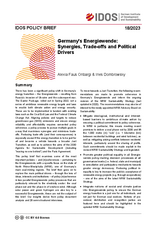Policy Brief
Germany's Energiewende: synergies, trade-offs and political drivers
Faus Onbargi, Alexia / Ines DombrowskyPolicy Brief (18/2023)
Bonn: German Institute of Development and Sustainability (IDOS)
DOI: https://doi.org/10.23661/ipb18.2023
Dt. Ausg. u.d.T.:
Die deutsche Energiewende: Synergien, Zielkonflikte und politische Triebkräfte
(Policy Brief 23/2023)
There has been a significant policy shift in Germany’s energy transition – the Energiewende – resulting from Russia’s invasion of Ukraine and the subsequent war. The Easter Package, rolled out in Spring 2022, set a series of ambitious renewable energy targets and laws to enable both climate action and energy security. These are to be implemented in tandem with existing laws such as the Coal Exit Law and the Federal Climate Change Act. Aligning policies and targets to reduce greenhouse gas (GHG) emissions and ensure energy reliability and affordability requires concerted policy coherence, a policy process to pursue multiple goals in a way that maximises synergies and minimises trade-offs. Reducing trade-offs (and their consequences) is especially crucial if the energy transition is to be just for all and become a vehicle towards a broader Just Transition, as well as to achieve the aims of the 2030 Agenda for Sustainable Development (including “leaving no one behind”) and the Paris Agreement. This policy brief first examines some of the most important policies – and (in)coherences – pertaining to the Energiewende, with a specific focus on the state of North Rhine-Westphalia (NRW), one of Germany’s main coal-mining regions. The brief then goes on to explore the main political drivers – through the lens of ideas, interests and institutions – of policy (in)coherence in two parallel Energiewende policy processes that are particularly relevant to the electricity sector: the coal phase-out and the phase-in of onshore wind. Although solar power and green hydrogen are also key to a successful Energiewende, these are not the subject of this brief. Our insights derive from policy document analysis and 28 semi-structured interviews. To move towards a Just Transition, the following recommendations are made to promote coherence in Germany’s Energiewende and inform the ongoing revision of the NRW Sustainability Strategy (last updated in 2020). The recommendations may also be of interest to the newly appointed NRW Advisory Board on Sustainability:
• Mitigate ideological, institutional and interest-based barriers to ambitious climate action by ensuring a political commitment to policy coherence. In NRW in particular, this means meeting recent promises to deliver a coal phase-out by 2030 and lift the 1,000 metre (m) “rule” (i.e. 1 kilometre (km) between residential buildings and wind turbines), as well as mitigating arising conflicts between residents’ interests, particularly around the sharing of profits. Such commitments should be made explicit in the revised NRW Sustainability Strategy and legislated.
• Promote greater political equality in all Energiewende policy-making decision processes at all governance levels (i.e. federal, state and municipal) in consultative and participatory mechanisms towards greater energy democracy. Reducing political in-equality is key to increase the public’s acceptance of renewable energy projects (e.g. through cooperatives) – one of the aims of the latest NRW Sustainability Strategy.
• Integrate notions of social and climate justice into Energiewende policy to ensure the German energy transition is a just one for all individuals, and not just for German coal workers. Notions of procedural, distribution and recognition justice are featured here and should be highlighted in the updated NRW Sustainability Strategy.
Contact
Cornelia Hornschild
Publication Coordinator
E-mail Cornelia.Hornschild@idos-research.de
Phone +49 (0)228 94927-135
Fax +49 (0)228 94927-130
Alexandra Fante
Librarian/ Open Access Coordinator
E-Mail Alexandra.Fante@idos-research.de
Telefon +49 (0)228 94927-321
Fax +49 (0)228 94927-130





![[Translate to English:] Photo: Alexandra Fante, Bibliothekarin/Open Access-Koordinatorin](/fileadmin/_processed_/f/0/csm__c_Deutsches-Institut-fuer-Entwicklungspolitik_Fante_94ce4fa1ba.jpg)